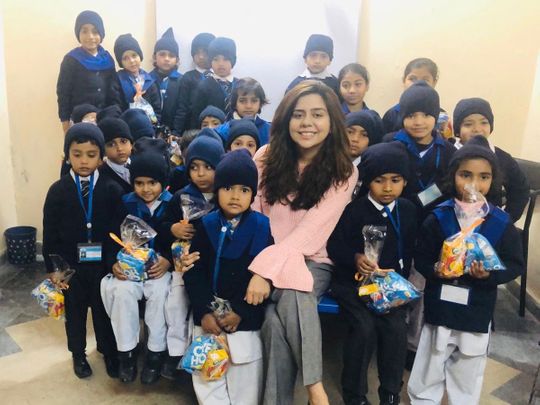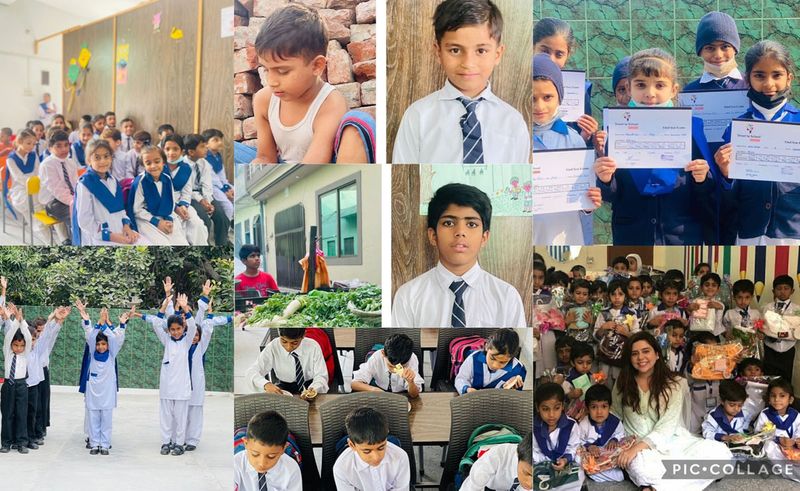
There is one question Amnah Umair asks every out-of-school child: What do you think is that one thing that you can only achieve through education?
Amnah, thirty-one, is mother of three and a PhD scholar. She is also a humanist whose deep empathy for those many of us see, feel bad for, look away and forget is manifested in Street to School. A school for the underprivileged children and teenagers that focusing on their micro and macro good prepares them to face their day-to-day and long-term challenges in a positive, forward looking, inclusive way.
Parental influences play a great role in the way Aminah, a single child, deals with her life’s issues, dilemmas, and tricky choices. The values her parents taught her are displayed in her compassion, concern, and care for the faceless nameless young of Pakistan. In her school all of them have identities. In her school they are all special. In her school they are all valued for what they are—beautiful young humans.
For Gulf News, I asked Amnah Umair a few questions:
Mehr Tarar: Wishing to do something and turning it into a reality are two steps, widely spaced, of a complex mechanism. You wanted to help street children and made a school for them. A process that is much more difficult than these simple words. What is the story of your Street to School?

Amnah Umair: I did my bachelor’s in business studies, and in community service required for my degree completion, I taught slum children. It was something I didn’t have any knowledge of—children of ages nine-twelve had NEVER been to school. What might be normal for some was a life changing moment for me. It gave a new meaning to my life, the kind of purpose our parents wish our lives to have and that we continue to seek.
After my masters, I got married. I landed a job, but also founded a small school for street children. Initially, students weren’t formally enrolled. Later, with the help of some friends, I opened a school for my students in a rented building in Walton, Lahore, and started a proper school system for street children. Originally, I had only five students, but the way the number doubled and tripled within days I was unable to accommodate many of them and temporarily put admissions on hold.
After a year and a half and many problems, I was unable to pay staff salaries and couldn’t afford the rent. We moved the school to the roof of the five-room mosque my father had purchased in his late twenties; the mosque had served as a madrassah for a while.
Many hurdles came my way—COVID-19, furniture and building issues—but I didn’t let anything affect me. My school’s current stable position is primarily because of my parents’ support.
Describe the structure of your school.
Currently, the school has 175-177 students with no specific age bracket; the youngest is three and a half years old, and the oldest recently got his CNIC. School starts at 7:00am; this slot is for young girls who with their mothers or alone work as domestic help. Regular school is 8:30am-1pm. At 2pm we have the afterschool session, which is mostly for street children and boy labourers. After 4:30pm, there is a small sewing school for divorced and widowed mothers of our students, a project I recently started for them to learn a skill and sustain a livelihood. I’m setting up a kitchen for them to learn cooking and be a home chef by partnering with a few online delivery food chains.
Our students are mostly malnourished, so we daily serve them a glass of milk, food, seasonal fruit, and juice. In case of a small medical emergency or an ailment, I fully cover their medical treatment.
What is your short- and long-term goal for the students at your school?
I only have big dreams for these children. I wish that all of them are highly educated and be successful in their lives.
It makes me extremely upset when I see poverty in Pakistan and meet people who are its biggest victims. When I see an out-of-school child, I only see an excellent individual that given an opportunity has the capacity to do so much for themselves and for their country.
Initially, I didn’t have much to offer. I relied on volunteers from different schools and universities. But what is required to teach these children is passion, and not everyone has that passion. Volunteers used to come for a day or two and then vanish. Working with out-of-school children is very, very difficult. I then had to change from volunteer teaching to regular paid teachers because my aim was to provide education, and that was only possible through a thorough plan and dedicated teachers. Today we have a ten-plus staff, all dedicated, passionate, and hardworking individuals who have a comprehensive knowledge of the strengths and weaknesses of each child and work with me towards the betterment of all our students.
In the beginning, we work on a student’s personality. We help them learn about keeping themselves clean and importance of hygiene, and we do that by giving them clean clothes, taking care of their hair and nails, have them follow a hygiene routine for which we give them small toilet bags that have soap, toothpaste, toothbrush, shampoo, and comb. Our students are always in clean uniforms and polished shoes and have neat hair and clipped nails.
I work and will continue to work on our students’ future in terms of helping them learn and become responsible individuals who know how to make healthy choices.
That one moment, or those many moments, when as a humanist, as an educationist you feel a great sense of fulfilment.
Every day, every sight of these children happily studying and enjoying school is a great sense of fulfilment for me. The joy, the contentment I feel is something indescribable.
There are a few moments in your life that change your perceptions completely. One was when during my BBA in 2014 I taught in slums. Students used to come to my house and study for a couple of hours in my driveway. Sometimes, I taught them on a green belt near my house.
Something else happened in 2016. It was an ordinary day for me as dropping my daughter off at her learning centre was part of my daily routine. Something broke my heart. At a traffic signal, I saw two children trying to sell colour pencils. I just could not stop thinking about their education and their future. I spent the whole day trying to figure out how I could help those children and make their lives better. I mean, those children were very young, around eight-ten years old. What had they done to deserve that life?
The very next morning I knew that I had to do something for those children. I started preparing myself to open a proper school for them, and in three months I was able to rent a small house where I founded my school. With the help of some very close friends, and my husband and family, we bought furniture and other stuff for school and started admissions.
Then I wanted our students to be in proper uniform, so I started working on that and soon managed to get them in uniforms. Because of unavailability of a parent or a guardian in morning, many children change when they arrive at school and change when they go home. I wanted to make them feel like other children going to school so that was another milestone.
My team and I looked for children in our vicinity. We checked workshops, roadside restaurants, bus stops, markets and visited homes where children were employed as help. We tried to help them in any way we could. Seeing a smile on their faces made me happy, and as time passed, it became an addiction. It was as if making those children happy had been the only thing missing in my life.
Whenever I used to see children selling stuff on roads, I wanted to do something for them; Street to School is just one milestone towards my aim. I’m doing my PhD in government and public policy with the aim to bring policy interventions specifically for street children, and how we can include them in our umbrella of education.
My school is truly committed to serving the disadvantaged with love and support. We work like a family where every member is striving towards a single objective—helping the underprivileged sections of society. Our focus is on helping those who need proper education. Children are the future of a nation, and they should be strengthened with the instrument of education, thus enabling them to individually bloom and contribute towards society’s advancement. Educational aid organizations can make a huge difference.
My belief is simple: everyone deserves an opportunity to pursue their dreams and wishes. Here at Street to School, I am fighting battles for children who deserve education, who deserve to go to school. We are not an association; we are a ray of hope for those who have stopped smiling.












